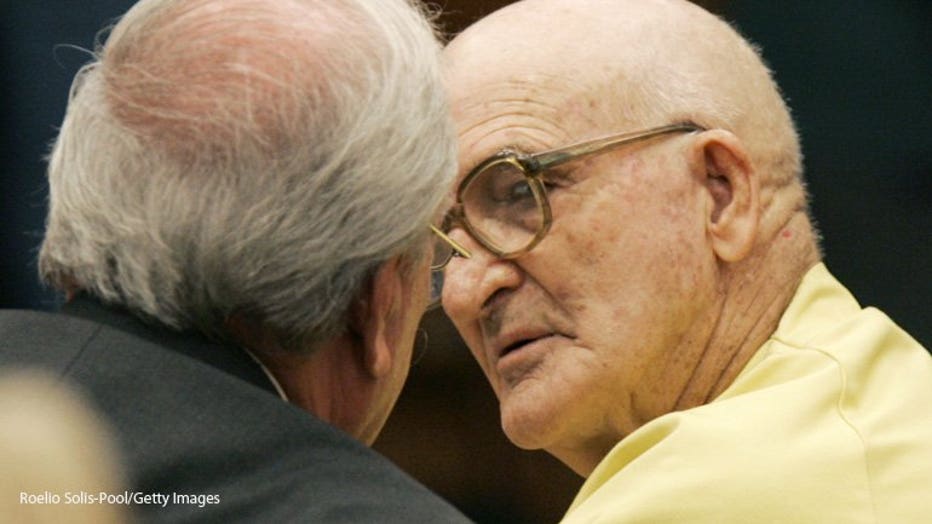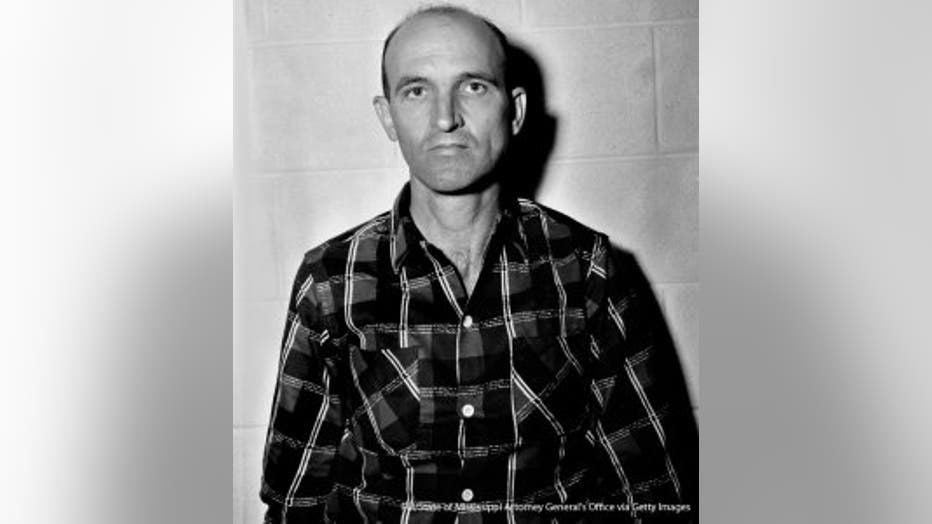'Mississippi Burning' KKK leader Edgar Ray Killen dies in prison at 92
JACKSON, Miss. — Edgar Ray Killen, a former Ku Klux Klan leader who was convicted in the 1964 "Mississippi Burning" slayings of three civil rights workers, has died in prison at the age of 92, the state's corrections department announced Friday.
The one-time Klan leader was serving three consecutive 20-year terms for manslaughter when he died at 9 p.m. Thursday night inside the Mississippi State Penitentiary. An autopsy was pending, but no foul play was suspected, the corrections' statement said.
His conviction came 41 years to the day after James Chaney, Michael Schwerner and Andrew Goodman, all in their 20s, were ambushed and killed by Klansmen.
The three Freedom Summer workers had been investigating the burning of a black church near Philadelphia, Mississippi. A deputy sheriff in Philadelphia had arrested them on a traffic charge, then released them after alerting a mob. Mississippi's then-governor claimed their disappearance was a hoax before their bodies were dug up.

PHILADELPHIA, MS - JUNE 23: Edgar Ray Killen (R) speaks with his attorney James McIntyre prior to being sentenced to the maximum 60 years in prison for masterminding the 1964 slayings of three civil rights workers June 23, 2005 in Philadelphia, Missi
The slayings shocked the nation, helped spur passage of the landmark Civil Rights Act of 1964 and were dramatized in the 1988 movie "Mississippi Burning."

PHILADELPHIA, MS - 1964: In this picture released by the FBI and the State of Mississippi Attorney General's Office, Edgar Ray Killen is seen June, 1964 in Philadelphia, Mississippi. The photograph was presented into evidence during the trial of Edga
The part-time preacher and lumber mill operator was 80 when a Neshoba County jury convicted him of three counts of manslaughter on June 21, 2005, despite his assertions that he was innocent. Killen was the only person ever to face state murder charges, and the only one to end up in state prison. "It wasn't even murder it was manslaughter," David Goodman, Andrew's younger brother, observed on Friday.
Killen wouldn't say much about the killings during a 2014 interview with The Associated Press inside the penitentiary. He said he remained a segregationist who did not believe in racial equality, but contended he harbored no ill will toward blacks. Killen said he never had talked about the events that landed him behind bars, and never would.
Long a suspect in the 1964 slayings, Killen had made a livelihood from farming, operating his sawmill and preaching to a small congregation at Smyrna Baptist Church in Union, south of Philadelphia, Mississippi.
According to FBI files and court transcripts from a 1967 federal conspiracy trial, Killen did most of the planning in the ambush killings of the civil rights workers. According to testimony in the 2005 murder trial, Killen served as a kleagle, or organizer, of the Klan in Neshoba County and helped set up a klavern, or local Klan group, in a nearby county.
Nineteen men, including Killen, were indicted on federal charges in the 1967 case. Seven were convicted of violating the victims' civil rights. None served more than six years.
Killen's federal case ended with a hung jury after one juror said she couldn't convict a preacher. During his state trial in 2005, witnesses testified that on June 21, 1964, Killen went to Meridian to round up carloads of Klansmen to ambush Schwerner, Chaney and Goodman, telling some of the Klan members to bring plastic or rubber gloves. Witnesses said Killen then went to a Philadelphia funeral home as an alibi while the fatal attack occurred.
The three bodies were found 44 days later, buried in a red-clay dam in rural Neshoba County.
In February 2010, Killen sued the FBI, claiming the government used a mafia hit man to pistol-whip and intimidate witnesses for information in the case. The federal lawsuit sought millions of dollars in damages and a declaration that his rights were violated when the FBI allegedly used a gangster known as "The Grim Reaper" during the investigation. The lawsuit was later dismissed.
In the AP interview, Killen repeated his contention that he was not a criminal, but a political prisoner. Of one thing he was certain: "I could have beat that thing if I'd had the mental ability."
When she learned of Killen's death, Chaney's sister, the Rev. Julia Chaney Moss, said her first thought was that "God has been kind to him. And for that I am grateful."
"My last thought on this is just that I only wish peace and blessings for all the families as well as the families of the perpetrators," she added.

